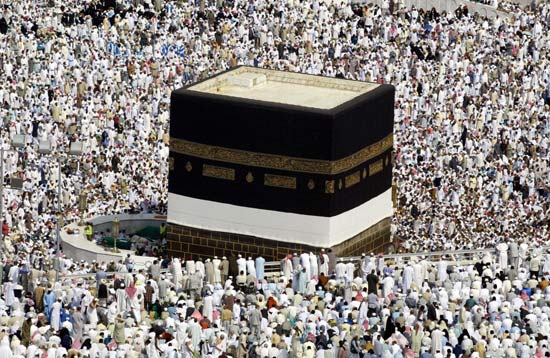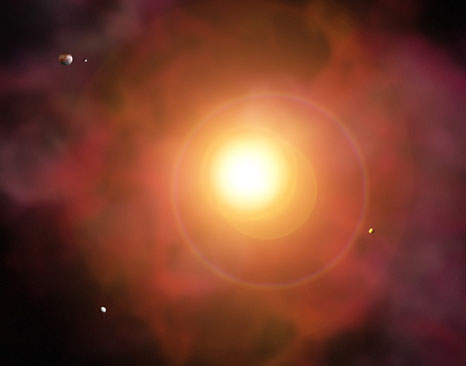Islam
- Michael Jackson’s $25,000 gold-plated bronze coffin (hand-polished). This post is a brief and timely diversion from our tafseer series. Michael Jackson was one of the most popular and well-known celebrities and icons of the western world; and now, he’s dead. As Muslims, what lessons can we learn from this event? I’ve listed below some of the lessons that came to my mind: Your Life is a Box. The Messenger of Allah (salallahu alayhi wa sallam) once drew a dot in the sand, and lines radiating out from it; he said (paraphrased), “this is the human, and their plans/desires.
3 Shields of Protection From Supernatural Forces
This is post #22 in our series on Tafseer of Juz ‘Amma (click the link to see all posts in this series).
 The protection of Allah is easily earned and very, very powerful.
The protection of Allah is easily earned and very, very powerful.Muslims love talking about Jinns and black magic. Yet, when it comes to inoculating themselves from supernatural forces, Muslims are often either ignorantly doing most of what they need to do, or proverbially standing on the interstate highway, woefully oblivious of thousands of cars speeding by at near-miss distances. And many of us, or people we know, personally do get hit.
Yet even the newest Muslim is often quickly equipped with powerful shields of protection against these forces. What are they?
The Carpet-Bombed Elephant
This is post #21 in our series on Tafseer of Juz ‘Amma (click the link to see all posts in this series). The Sabab-un-Nuzool (reason of revelation) for Surah Fil well-known; you can read all about it, along with some lessons and gems, in this post by Sr. Mariam 3.36. Please read it, since I won’t touch on those points. I will mention, however, two points not mentioned there–that the Christian tyrant king who brought his elephant, why did he decide to destroy the Ka’bah?Say: O You Kafiroon …
Note: This is post #20 in our series on Tafseer of Juz ‘Amma (click the link to see all posts in this series).
In Surah Kafiroon, Allah says:
قُلْ يَا أَيُّهَا الْكَافِرُونَ
لَا أَعْبُدُ مَا تَعْبُدُونَ
وَلَا أَنتُمْ عَابِدُونَ مَا أَعْبُدُ
وَلَا أَنَا عَابِدٌ مَّا عَبَدتُّمْ
وَلَا أَنتُمْ عَابِدُونَ مَا أَعْبُدُ
لَكُمْ دِينُكُمْ وَلِيَ دِينِ
Translation: Say, “O disbelievers, I do not worship what you worship. Nor are you worshippers of what I worship. Nor will I be a worshipper of what you worship. Nor will you be worshippers of what I worship. For you is your religion, and for me is my religion.” [Surah Kafiroon]
The mushrikeen (polytheists) of Mecca tried many, many different techniques to get the Prophet (salallahu alayhi wa sallam) to stop spreading Islam.
Before this ayah was revealed, they decided to make a pact with him. They said, “Look, how about this–you worship our gods for one year, and we’ll worship your God for one year.” And to sweeten the deal: “And, we’ll go first.”
And they applied the Broken Record technique. Whenever the Prophet (salallahu alayhi wa sallam) would try to speak to them about Islam, they would only repeat this.
And he, salallahu alayhi wa sallam, refused.
Those of you who are wondering why–although it seems on the surface like a fair trade, it’s not. Allah does not forgive shirk, worshipping other than him; not even a single sujood, or a single du’a, none of it is acceptable.
So clearly, this is not a contract the Messenger of Allah could engage with. So he refused.
And he refused.
And he refused.
Then, the Mushrikeen said, “ok, how about this–just speak highly of our gods, and we’ll do the same for you.” A smaller compromise.
And whenever people approached them, they would say, “Well, we’re trying to compromise (like we’re the good ones in this deal–even though we kill our daughters and murder on whims and …), but he’s not agreeing.”
So the Prophet (salallahu alayhi wa sallam) went to the ka’bah.

Mushrikeen were there. And in front of everybody he said:
Those Who Show Off in Their Salah
Note: This is post #19 in our series on Tafseer of Juz ‘Amma (click the link to see all posts in this series). In Surah Ma’oon, Allah says: فَوَيْلٌ لِّلْمُصَلِّينَ الَّذِينَ هُمْ عَن صَلَاتِهِمْ سَاهُونَ الَّذِينَ هُمْ يُرَاءُونَ وَيَمْنَعُونَ الْمَاعُونَ Translation: So woe to those who pray; those who are heedless of their prayer, those who make show [of their deeds]; And withhold [simple] assistance (al-ma’oon). [Surah Ma’oon, verses 4-7]Do YOU Encourage Good?
Note: This is post #18 in our series on Tafseer of Juz ‘Amma (click the link to see all posts in this series). Insha’Allah we’ll be kicking up the post frequency to three times a week in order to finish before Ramadan.
Allah says, in Surah Ma’oon:
أَرَأَيْتَ الَّذِي يُكَذِّبُ بِالدِّينِ
فَذَلِكَ الَّذِي يَدُعُّ الْيَتِيمَ
وَلَا يَحُضُّ عَلَى طَعَامِ الْمِسْكِينِ
Translation: Have you seen the one who denies the Repayment? For that is the one who drives away the orphan, and does not encourage the feeding of the poor. [Surah Ma’oon, verses 1-3]
Notice the connection here–verse one, the one who denies Ad-Deen, the Day of Repayment. And verse two and three? He drives away orphans, He doesn’t encourage feeding of the poor.
It’s not that he doesn’t feed the poor. It’s that he doesn’t encourange feeding the poor.
Al-Hakumu At-Takathur …
Note: This is post #17 in our series on Tafseer of Juz ‘Amma (click the link to see all posts in this series).
 Competition in [worldly] increase diverts you, until you visit the graves …
Competition in [worldly] increase diverts you, until you visit the graves …Allah says, in Surah At-Takaathur:
أَلْهَاكُمُ التَّكَاثُرُ
حَتَّى زُرْتُمُ الْمَقَابِرَ
Translation: Competition in [worldly] increase diverts you, until you visit the graveyards. [Surah At-Takaathur, verses 1-2]
Subhanallah, even though these verses were revealed over 1400 years ago, we still see the exact same situation today. Al-Haakum means, it makes you compete with each other. At-Takaathur is rivalry, competition, in accumulating material things; thinking that life is about toys, and the one with the most (or most expensive) toys wins.
What is Takaathur?
Arabic Explanation of Surah Takweer
Note: This is post #17 in our series on Tafseer of Juz ‘Amma.
 When the sun is kuwwirat …
When the sun is kuwwirat …We’re going to digress a bit and jump back to Surah Takweer. This post is based on Shaykh Nouman Khan’s tafseer, which heavily emphasizes the Arabic language. I hope you will find, as I found it, as a glimpse of a previously-unseen world, a depth of knowledge that just drips from the Arabic language.
Allah says, in surah Takweer:
إِذَا الشَّمْسُ كُوِّرَتْ
Translation: When the sun is kuwwirat … [verse 1]
There are a lot of gems that we learn even from this first ayah:
- Idhaa + Past-Tense: Idhaa is an indicator of future-tense “when (something will happen).” Yet, kuwwirat is past-tense; why? This combination means something is so certain, it’s like past-tense. So Allah is saying “when this happens,” yet it’s certain that it WILL happen; as certain as the past is past.
- Nominal Sentence: The default in Arabic is to put the verb first–“kuwwirat ash-shamsu.” To reverse this into “ash-shamsu kuwwirat,” shows emphasis, and makes it a tougher, stronger sentence. This hints at the audience–Mushrikeen in Mecca, the worst and most obstinate of them, who are listening to this revelation.
- Passive Voice: Allah could have said, “When I wrap up the sun,” but He didn’t. Why? If you’re biased against someone (say a political party), no matter what they say, even before they open their mouth, you say, “psshh.” But here, passive-voice highlights the maf’ool, the recipient of the action–the sun, the stars–instead of the doer.
As for the meaning of kuwwirat, kawwara means to wrap something around something; it’s used in the context of a turban, something long, that’s wrapped around your head.
Allah is applying the same meaning here–that the light of the sun, something that’s long, will be kuwwirat, wrapped up. Wrapped up meaning, something will cover it, and it will no longer be visible; and it will be wrapped slowly, part by part disappearing–the same way that Allah described the day as wrapping around the night and the night wrapping around the day.
This is something scary–that you see the sun wrapped up, and losing its light. But there’s more …
Indeed, We Gave You Al-Kawthar
Note: This is post #16 in our series on Tafseer of Juz ‘Amma.
 Indeed, We gave you Al-Kawthar.
Indeed, We gave you Al-Kawthar.Allah says, in Surah Al-Kauthar:
إِنَّا أَعْطَيْنَاكَ الْكَوْثَرَ
فَصَلِّ لِرَبِّكَ وَانْحَرْ
إِنَّ شَانِئَكَ هُوَ الْأَبْتَرُ
Translation: Indeed, We have granted you, [O Muhammad], al-Kawthar. So pray to your Lord and sacrifice [to Him alone]. Indeed, your enemy is the one cut off. [Surah Kawthar, verse 1-3]
Many of you know the hadith where the Messenger of Allah (salallahu alayhi wa sallam) was napping under a tree, and he woke up, smiling; and he said, Allah revealed to me this surah.
Interestingly, the ‘ulama have discussed this–is it possible that Allah sends revelation in a dream? The answer is, surprisingly, no; of the 6-7 ways, the most common is through Jibreel (alayhi salaam). Even here, there’s no indication that the surah was revealed through a dream–perhaps Jibreel (alayhi salaam) came to the Prophet once he had woken, and revealed it to him. (For more information, check our posts on Route 114: Uloom Al-Qur’an)
In verse 1, Allah says: Inna ‘ataynaaka al-kawthar. These two words allude to an enormous giver, giving an enormous gift. Allah could’ve just said: ataytuka al-kawthar; but that would’ve been weak, human speech. Instead, he uses inna–emphasis, and refers to himself in the “royal we” (something we have in English, too).
When the War-Horses Pant …
Note: This is post #15 in our series on Tafseer of Juz ‘Amma.

Allah begins Surah Aadiyaat by saying:
وَالْعَادِيَاتِ ضَبْحًا
فَالْمُورِيَاتِ قَدْحًا
فَالْمُغِيرَاتِ صُبْحًا
فَأَثَرْنَ بِهِ نَقْعًا
فَوَسَطْنَ بِهِ جَمْعًا
Translation: By the ‘aadiyaat, when they pant, and the muwriyraat striking (when their hoves strike the ground and make sparks), and the mughiyraat, at dawn (when they raid), stirring up thereby [clouds of] dust, arriving thereby in the center collectively, …
This is a qasam (oath), a big oath that spans five ayaat. I’m going to dive into word-for-word translation, because no translation can do justice (without paragraphs of brackets).
‘Aadiyaat (عَادِيَات) are horses (plural: sound feminine plural, in fact). Not those horses you see Canadian Mounties riding; but real, true, WAR horses. If you’ve ever seen war-horses (send us a picture!), they have a special, particular intensity to them.
Dabhaa (ضَبْحًا) means to pant. Pant meaning, if you’ve ever run in a 100-meter race, or tried to run until you’re tired, and you start breathing heavily through your mouth–that’s panting. Why are the ‘aadiyaat panting? Because they are charging into battle.
You’ll see lots of war concepts here. The Arabs at the time of the Prophet (salallahu alayhi wa sallam) knew these things very, very well; and when Allah testifies, these things he testifies by–nobody would deny them.
Muwriyaat (مُورِيَات) are also war-horses–the ones that strike. Strike meaning, when they run, their hooves strike up sparks on the ground. I definitely don’t encourage watching movies, so if you’ve ever read seerah stories, or perhaps Lord of the Rings, or similar books, you might find these kinds of concepts in their battles.
Mughiyraat (مُغِيرَات) are the raiding horses. In the time of the Prophet, they would have raids; you would see a whole army of horses and riders sweeping into a city, and they’d kill everybody and destroy it. Mughiyraat are those raiding horses that they rode.